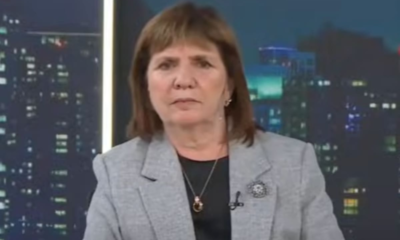INTERNACIONAL
The Speaker’s Lobby: ‘Whose throat do I get to choke?’

It was a split screen Tuesday morning on Capitol Hill.
One eye on the markets. The other eye on the Senate testimony of U.S. Trade Representative Jamieson Greer.
«Do you think your remarks will alter the markets in any way?» yours truly asked Greer as he walked to the hearing room in the Dirksen Senate Office Building.
«I’m just going to respond to the senators. Be candid as I can be,» replied Greer.
TRUMP TRADE REP TAKES BIPARTISAN FIRE OVER TARIFFS AS DEM LAUNCHES BID TO HALT THEM
The public has heard a lot about tariffs from Commerce Secretary Howard Lutnick.
They’ve heard a lot about tariffs from Treasury Secretary Scott Bessent.
They’ve heard even more about tariffs from White House advisor Peter Navarro.
But until Tuesday morning, there was little said about tariffs from the man in charge of the administration’s trade policy: Jamieson Greer.
All eyes were on two things Tuesday morning — the stock market and Trade Representative Jamieson Greer. (AP/Getty Images)
«The president’s strategy is already bearing fruit,» Greer testified. «Nearly 50 countries have approached me personally to discuss the president’s new policy and explore how to achieve reciprocity.»
Democrats were dubious about Greer’s suggestion. Yes, nations may be willing to negotiate. But carving out sophisticated trade agreements with nations just sanctioned by the U.S. takes time.
«You’re telling us you have nearly 50 countries coming to you, approaching you to enter into negotiation, and you think that you can do that overnight?» asked Sen. Catherine Cortez Masto, D-Nev. «You’re pretty superhuman here, if that’s the case.»
TRUMP TRADE CHIEF FACES HOUSE GRILLING ON TARIFFS
Greer tangled with Sen. Maggie Hassan, D-N.H.
«Even if inflation hits Americans’ pocketbooks at 10% because of these tariffs, then the Trump administration is still going to go charging ahead?» asked Hassan.
«Senator, your hypotheticals are not consistent with the history we have seen with tariffs,» Greer replied.
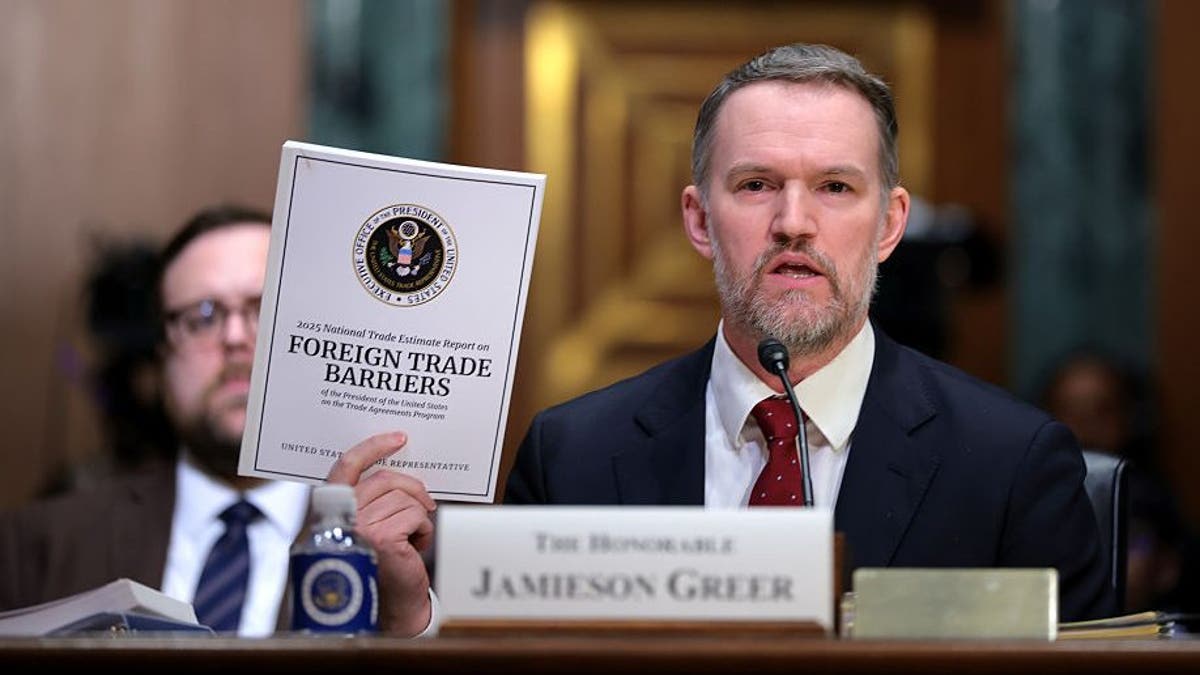
Greer got the third degree from members of Congress on both sides of the political aisle. (Kayla Bartkowski/Getty Images)
«My hypotheticals are based on the fact that a lot of Americans are looking at their 401(k)’s today and wondering how much of a lifestyle change they are going to have to have or whether they’re going to be able to retire when they plan to,» Hassan shot back. «This has been a haphazard, incompetent effort. And it’s showing.»
After rough showings, the markets actually shot up at the opening bell Tuesday before Greer spoke. It didn’t appear that anything Greer told senators resonated positively or negatively on Wall Street. But lawmakers were well attuned to the market fluctuations.
Especially as they started to hear from constituents.
TRUMP SAYS HE’LL ‘TAKE A LOOK’ AT EXEMPTING SOME LARGER US COMPANIES HIT ESPECIALLY HARD BY TARIFFS
Outside the hearing room, Sen. John Kennedy, R-La., offered one of his signature Bayou homilies to characterize the unfolding trade war.
«God created the world. But everything else is made in China,» said Kennedy.
«But senator, isn’t the bigger issue here the question of the uncertainty in the markets and rattling around?» I asked Kennedy.
«Well, there’s always uncertainty,» answered Kennedy.
«But this is a different type of uncertainty, though, Senator,» I countered.
«Is it going to have to have an impact on your capital markets? Well, yes. Duh. And it’s not fun. It’s very, very painful. Whether this will have a happy ending or a sad ending depends in large part what President Trump does next,» said Kennedy.
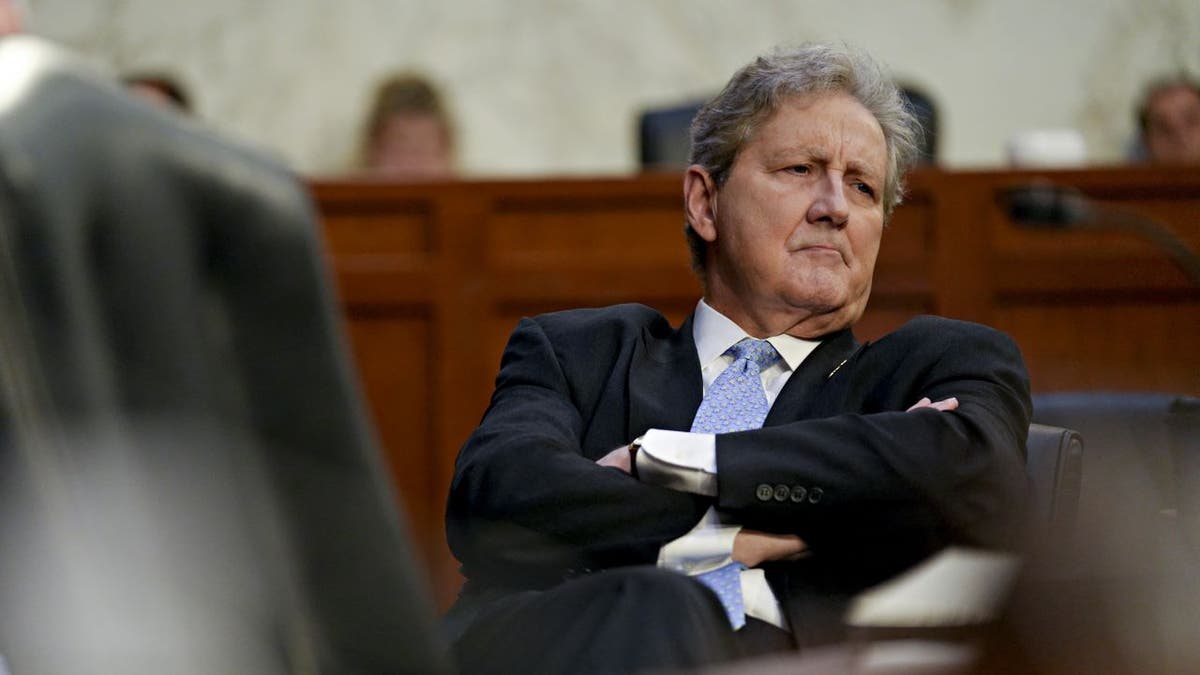
Sen. John Kennedy, R-La., acknowledged the fate of the market lies largely in the hands of President Trump and whatever his administration does next. (Eric Lee/Bloomberg via Getty Images)
And that’s the key to the entire enterprise. It doesn’t matter what Lutnick does. Or Bessent. Or Navarro. And not Greer. For better or worse, this is President Trump’s baby. Only he can move markets. And potentially trade deals. And that’s certainly what unfolded in recent days.
Democrats — and some Republicans — excoriated the president for unilaterally imposing the tariffs. Lawmakers asked the reasoning for imposing the tariffs. And they argued that the tariffs should have been an issue which came to Capitol Hill.
«Where was the consultation with Congress about this? Where is the homework? You know, Greek and Roman letters thrown on a plaque doesn’t mean a strategy that you’ve informed Congress on,» Sen. Maria Cantwell, D-Wash., the top Democrat on the Senate Commerce Committee, asked. «And part of the question is, where’s the homework done by the administration to not misconstrue the authority that was given?»
SCHUMER SAYS TRUMP ‘FEELING THE HEAT’ AFTER RECIPROCAL TARIFF PAUSE
Cantwell may not have received a sufficient answer from the Trump administration on the rationale. But Sen. Josh Hawley, R-Mo., answered the other part of the question about why the President cut Congress out of the loop.
«Let’s not pretend that this is anything other than the president exercising the statutory authority Congress has given him for decades,» said Hawley. «Because Congress didn’t want to do tariffs, they didn’t want to do trade, it was too hot. They wanted the president to hold the hot potato. So now you’ve got a President who’s happy to do that.»
Article I, Section 8 of the Constitution declares that Congress has the «Power To lay and collect Taxes, Duties, Imposts and Excises to pay the Debts and provide for the common Defence and general Welfare of the United States.»
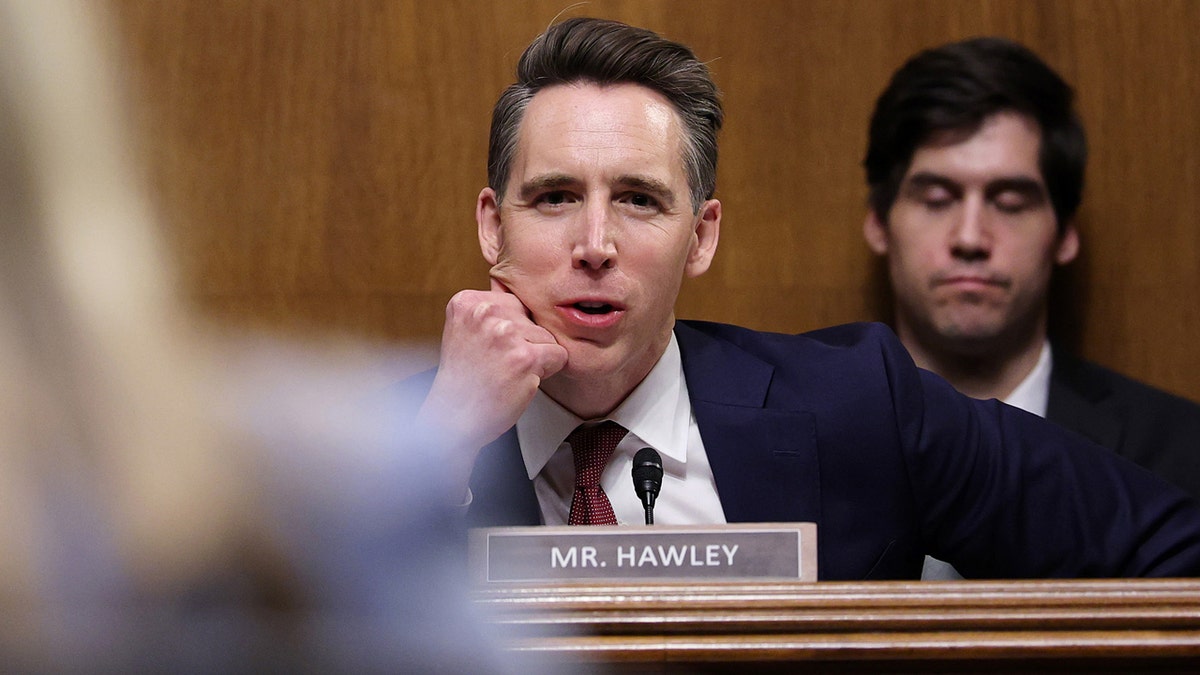
«Let’s not pretend that this is anything other than the president exercising the statutory authority Congress has given him for decades,» Sen. Josh Hawley, R-Mo., said of Trump’s imposition of tariffs. (Win McNamee/Getty Images)
The Office of the U.S. Trade Representative says the U.S. is a signatory to more than 14 total trade pacts. Congress has ratified several of those in recent years. That includes the USMCA. That’s a trade pact President Trump pushed – alongside former House Speaker Nancy Pelosi, D-Calif., in 2020 for the U.S., Mexico and Canada. That deal replaced NAFTA, the North American Free Trade Agreement, approved by Congress in 1993. Congress also greenlighted «CAFTA, the Central American Free Trade Agreement, in 2005.
So, Congress has engaged in trade somewhat in recent decades. But maybe not as much as it should have.
Greer appeared for a second time on Capitol Hill Wednesday, testifying before the House Ways and Means Committee.
TRUMP PUSHES BACK ON ‘REBEL’ REPUBLICANS OVER TARIFFS: ‘YOU DON’T NEGOTIATE LIKE I NEGOTIATE’
«Any deal that you do, are you going to bring that to Congress for a vote?» asked Rep. Suzan DelBene, D-Wash.,
«We’ll do what the law requires. Some of it’s consultation. Some requires a vote. So we’ll follow the law,» replied Greer.
But DelBene pressed Greer on the president using emergency powers on the tariffs. She quoted from the statute.
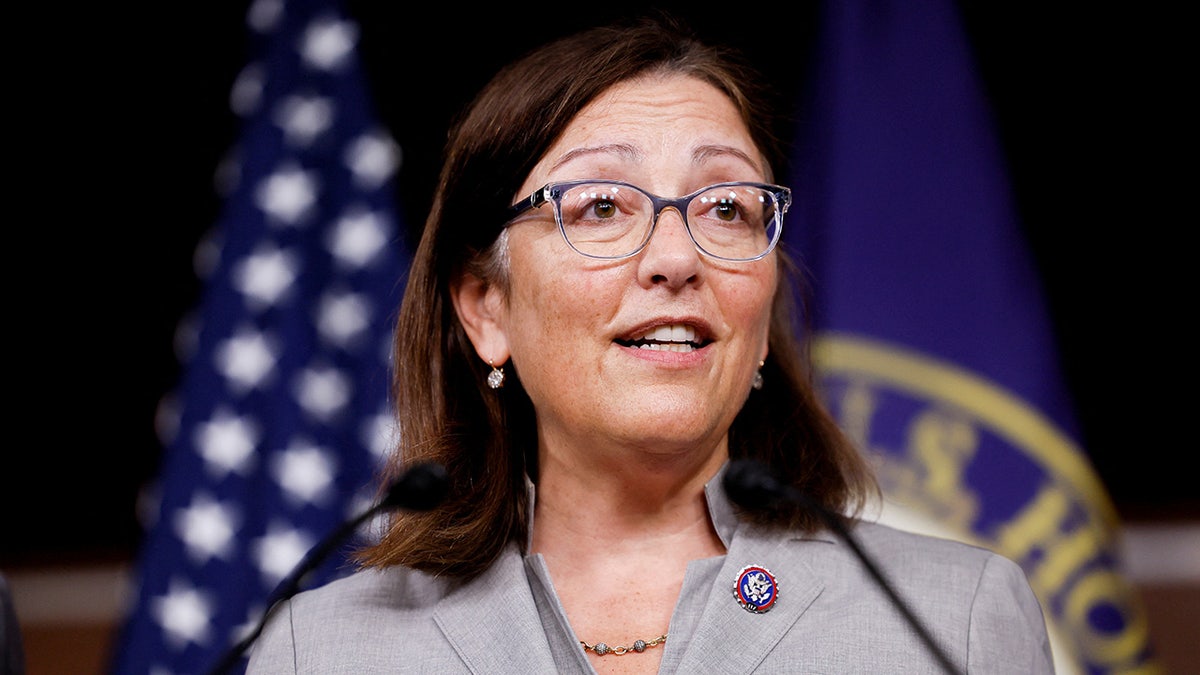
Rep. Suzan DelBene, D-Wash., pressed Greer on the Trump administration’s leveraging of executive powers. (Reuters)
«It states, ‘The President, in every possible instance, shall consult with Congress before exercising any powers,’» said DelBene. «That didn’t happen.»
Greer said he called Ways and Means Committee Chairman Jason Smith, R-Mo., and the top Democrat on the panel, Rep. Richard Neal, D-Mass.
«I argue that we did not have that consultation,» said DelBene, who sits on the trade subcommittee.
WHITE HOUSE WARNS AGAINST TARIFF RETALIATION, SAYS TRUMP ‘HAS SPINE OF STEEL AND HE WILL NOT BREAK’
But less than two hours later — with Greer still testifying — President Trump announced he was now pausing most tariffs for three months. But still imposing steep tariffs on China.
Rep. Steven Horsford, D-Nev., was apoplectic.
«He announced it on a tweet?» an incredulous Horsford asked of Greer. «WTF? Who’s in charge?»

Rep. Steven Horsford, D-Nev., appeared beyond furious with the rollout of Trump’s tariff plan. (Leigh Vogel/Getty Images for Congressional Black Caucus Foundation)
«The president of United States is in charge,» Greer said.
«And what do you know about those details?» countered Horsford. «It looks like your boss just pulled the rug out from under you.»
Horsford later asked if what the President executed was «market manipulation.» Greer said it wasn’t.
HOUSE DEMOCRAT SAYS HE’D VOTE TO PROTECT TRUMP’S TARIFF PLAN, WORRIES WHITE HOUSE WILL STAND DOWN
So, when the hearing adjourned, yours truly and Nikole Killion of CBS pursued Greer to get more clarity on the president’s new strategy.
«Can you explain why you were caught flat-footed about the change in the trade policy? Were you aware of any of this?» I asked Greer before he stepped into an anteroom.
We resumed the quest in the hall.
«Were you not told about this?» I asked.
«Did you know before your testimony?» added Killion.
«I’ll just refer you to my testimony,» said Greer.
«Your testimony did not reflect what it was implemented during the hearing,» I followed up.
«I’ll just refer you to my testimony,» Greer repeated.
«But that’s inconsistent with the decision of the president,» I said.
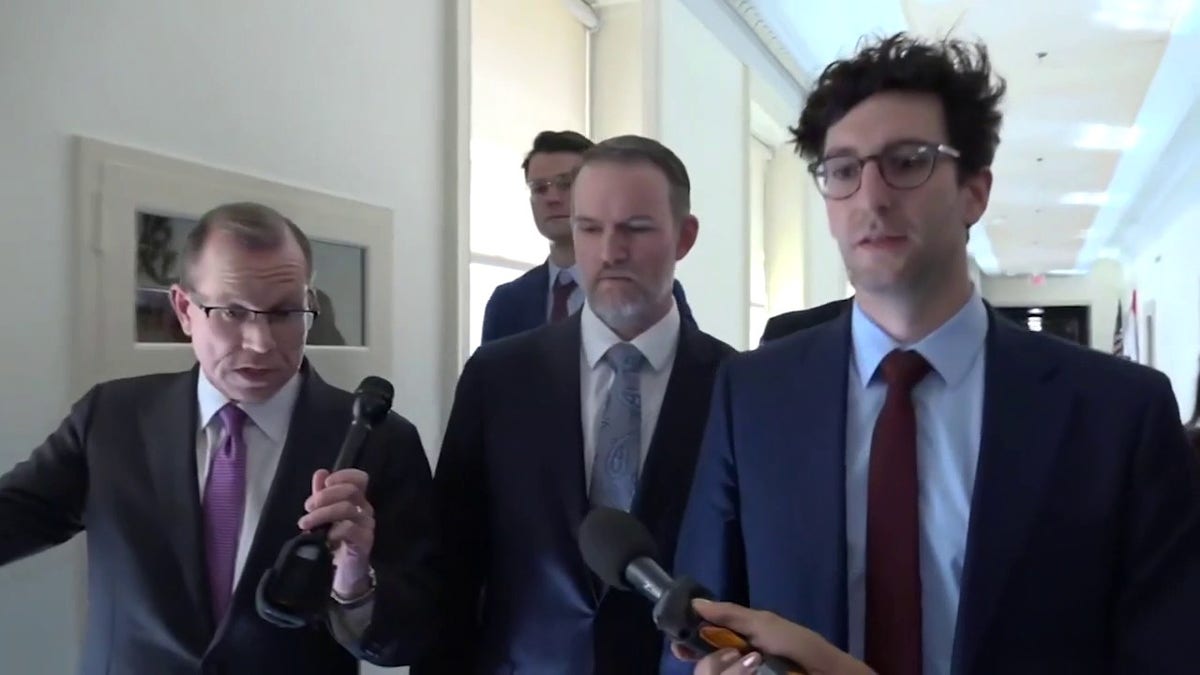
I tried to get a few answers out of Greer after one of his hearings. He remained fairly mum on most of what he was asked. (FOX)
An aide to Greer then intervened.
«I think the ambassador was extremely clear in his testimony about what was going on, and the president could make the choice,» the aide interjected.
«Explain why you don’t think that this was market manipulation. You said it wasn’t,» I followed up.
HOUSE CONSERVATIVES READY TO OPPOSE SENATE GOP FRAMEWORK FOR TRUMP TAX CUT PACKAGE
«Were you aware that there would be a pause before you came here to Capitol Hill? Yes or no? Yes or No, sir?» Killion continued.
Greer then disappeared down a winding staircase in the Longworth House Office Building.
Let’s shift back to the Senate hearing on Tuesday with Greer.
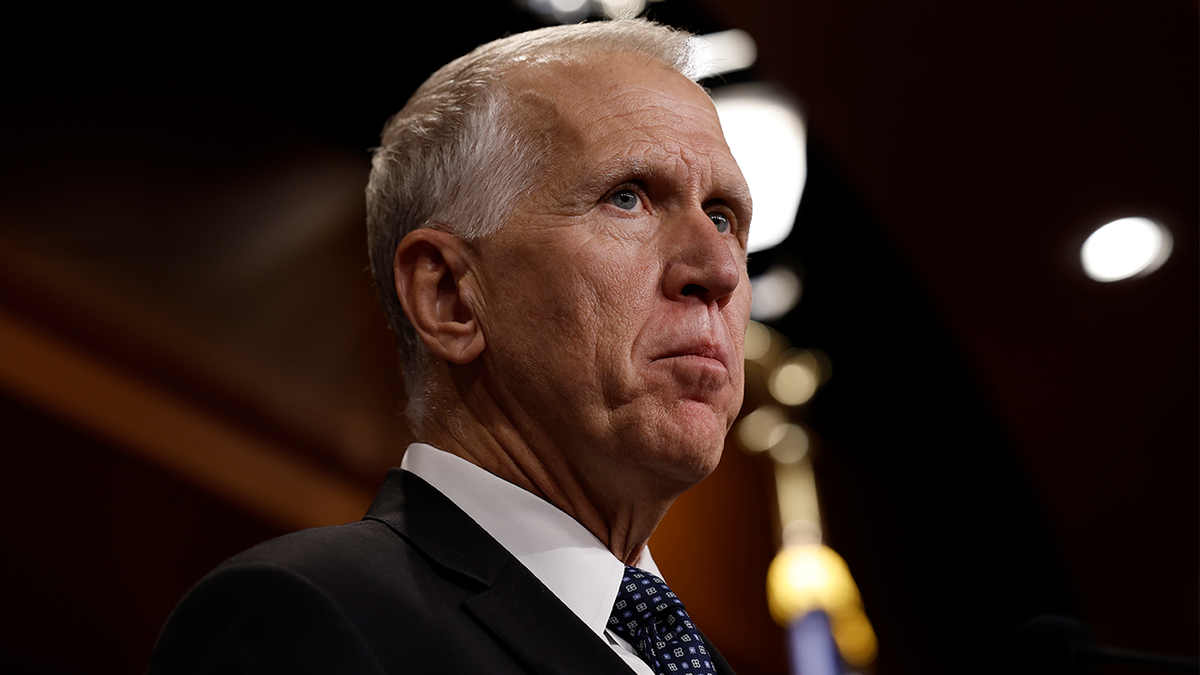
Sen. Thom Tillis, R-N.C., who faces a potential uphill battle for re-election next year, was more blunt in his questioning of Greer, asking, «Whose throat do I get to choke if this proves to be wrong?» (Anna Moneymaker/Getty Images)
Sen. Thom Tillis, R-N.C., could face a competitive re-election bid next year. He asked a pointed question to Greer.
«Whose throat do I get to choke if this proves to be wrong?» Tillis asked.
«Well, Senator, you can certainly always talk to me,» replied Greer.
CLICK HERE TO GET THE FOX NEWS APP
«So, if you own this decision, I’ll look to you to figure out if we’re going to be successful,» said Tillis. «If you don’t own the decision, I’m just trying to figure out who’s throat I get to choke if it’s wrong.»
Congress,Trade,Trump’s First 100 Days,Economy,Senate,House Of Representatives
INTERNACIONAL
Schumer, Democrats try to save face, blame GOP for possible government shutdown
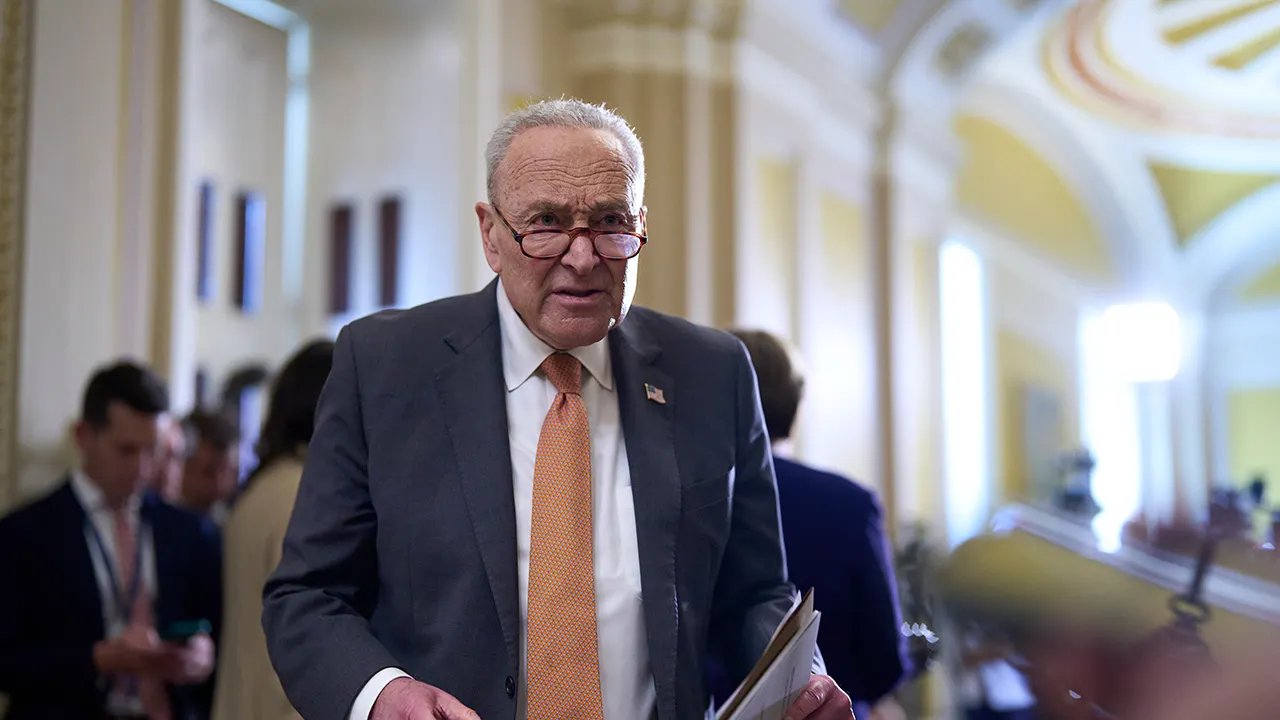
NEWYou can now listen to Fox News articles!
Congressional Democrats are trying to get on the same page and display a unified front after threatening to derail the government funding process.
Senate Minority Leader Chuck Schumer, D-N.Y., and House Minority Leader Hakeem Jeffries, D-N.Y., met behind closed doors Tuesday night, along with the top Democrats in the House and Senate Appropriations Committees, to plot a course forward in the forthcoming government funding fight.
SENATE WEATHERS DEM OPPOSITION, ADVANCES FIRST GOVERNMENT FUNDING BILL
Senate Minority Leader Chuck Schumer, D-N.Y., turns to an aide during a news conference at the Capitol in Washington, D.C., on June 3, 2025. (AP Photo/J. Scott Applewhite)
The meeting came after Democrats in the upper chamber overwhelmingly supported the first government funding bill to hit the Senate floor, one that would fund military construction and Veterans Affairs. Ahead of the vote, Senate Democrats had signaled they may vote against the bill and further obstruct the appropriations process because of highly partisan legislation rammed through the upper chamber by Senate Republicans.
«We all want to pursue a bipartisan, bicameral appropriations process,» Schumer said. «That’s how it’s always been done, successfully, and we believe that, however, the Republicans are making it extremely difficult to do that.»
The meeting just off the Senate floor was meant to get congressional Democrats on board with a messaging plan over the next weeks and months ahead of the Sept. 30 deadline to fund the government.
CONGRESSIONAL REPUBLICANS FACE BRUISING BATTLE TO AVOID GOVERNMENT SHUTDOWN
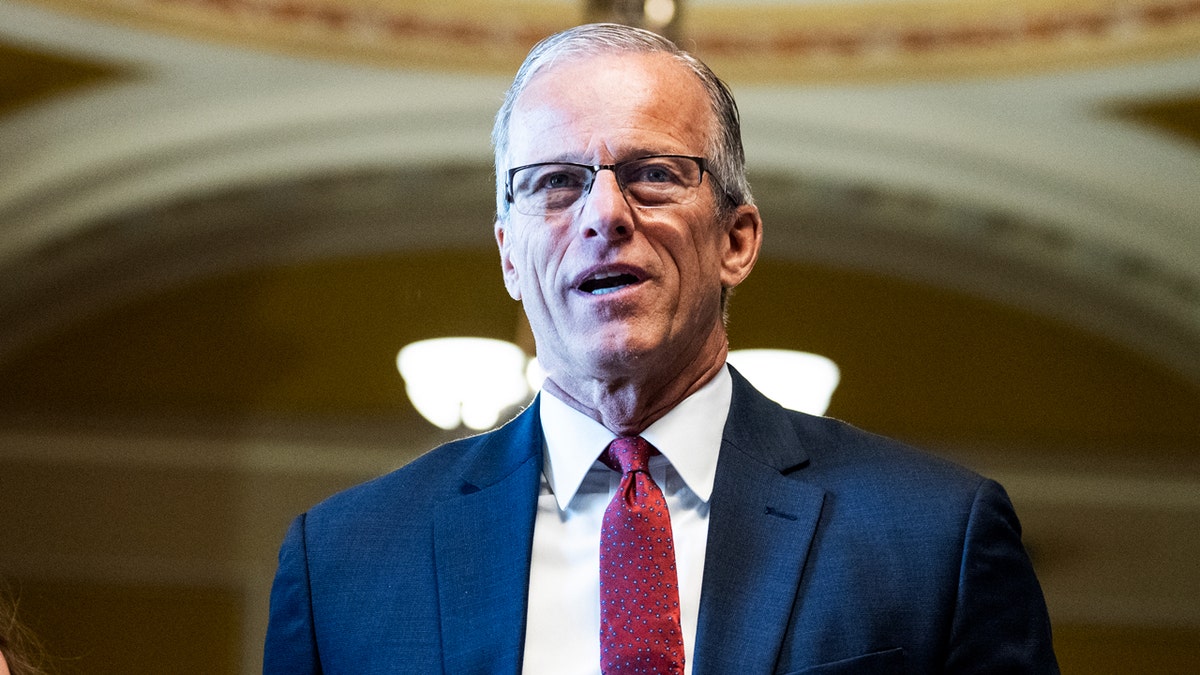
Senate Majority Leader John Thune, R-S.D., is seen after the Senate luncheons in the U.S. Capitol on June 24, 2025. (Tom Williams/CQ-Roll Call, Inc via Getty Images)
It was also likely designed to prevent a repeat of the Democratic debacle in March, when Schumer broke with Jeffries and threatened to shutter the government before ultimately caving and providing Republicans the votes necessary to advance yet another government funding extension, known as a continuing resolution.
Republicans are quick to point out that when Schumer led the upper chamber, none of the House GOP’s spending bills made it to the floor — in Congress, the spending process begins in the lower chamber.
Since taking over earlier this year, Senate Majority Leader John Thune, R-S.D., has committed to returning to regular order, or passing each of the dozen spending bills to fund the government, and trying to get the appropriations process back to normal.
However, it’s a feat that hasn’t been successfully done in Washington since the late 1990s.
«Frankly, I think a lot of us around here think [this] is long overdue,» Thune said.
However, Democrats contend that their trust in Republicans is wearing thin after two major partisan bills, one being President Donald Trump’s «big, beautiful bill,» and the other the president’s $9 billion clawback package, were pushed through the chamber without any Democratic input.
‘BAIT AND SWITCH’: SCHUMER WARNS OF BITTER FUNDING FIGHT OVER GOP CUTS PLAN

Representative Hakeem Jeffries, a Democrat from New York, speaks during a news conference at the U.S. Capitol in Washington, D.C., on Feb. 6, 2025. (Tierney L. Cross/Bloomberg via Getty Images)
Thune argued that Senate Democrats were using the rescissions package to shut down the appropriations process and effectively shut down the government.
In the Senate, most bills that come to the floor require at least 60 votes to smash through the filibuster, meaning that most legislation requires bipartisan support to some extent.
Earlier this year, the House GOP produced a partisan government funding extension that was a tough pill for Senate Democrats to swallow, but they still ultimately opted to vote for it. This time around, they’re demanding more involvement in the process.
CLICK HERE TO GET THE FOX NEWS APP
Jeffries said that congressional Democrats would play ball if the process was «bipartisan and bicameral in nature» and put the onus of a partial government shutdown at the feet of congressional Republicans.
«House Republicans are, in fact, marching us toward a possible government shutdown that will hurt the American people,» he said.
However, House Speaker Mike Johnson, R-La., threw the responsibility on Democrats over whether the government would shutter or stay open come the end of September.
«They’re gaming out how they can shut the government down,» Johnson told Bloomberg Government.
INTERNACIONAL
Ucrania: el presidente Volodimir Zelenski enfrenta críticas y protestas por una nueva ley anticorrupción
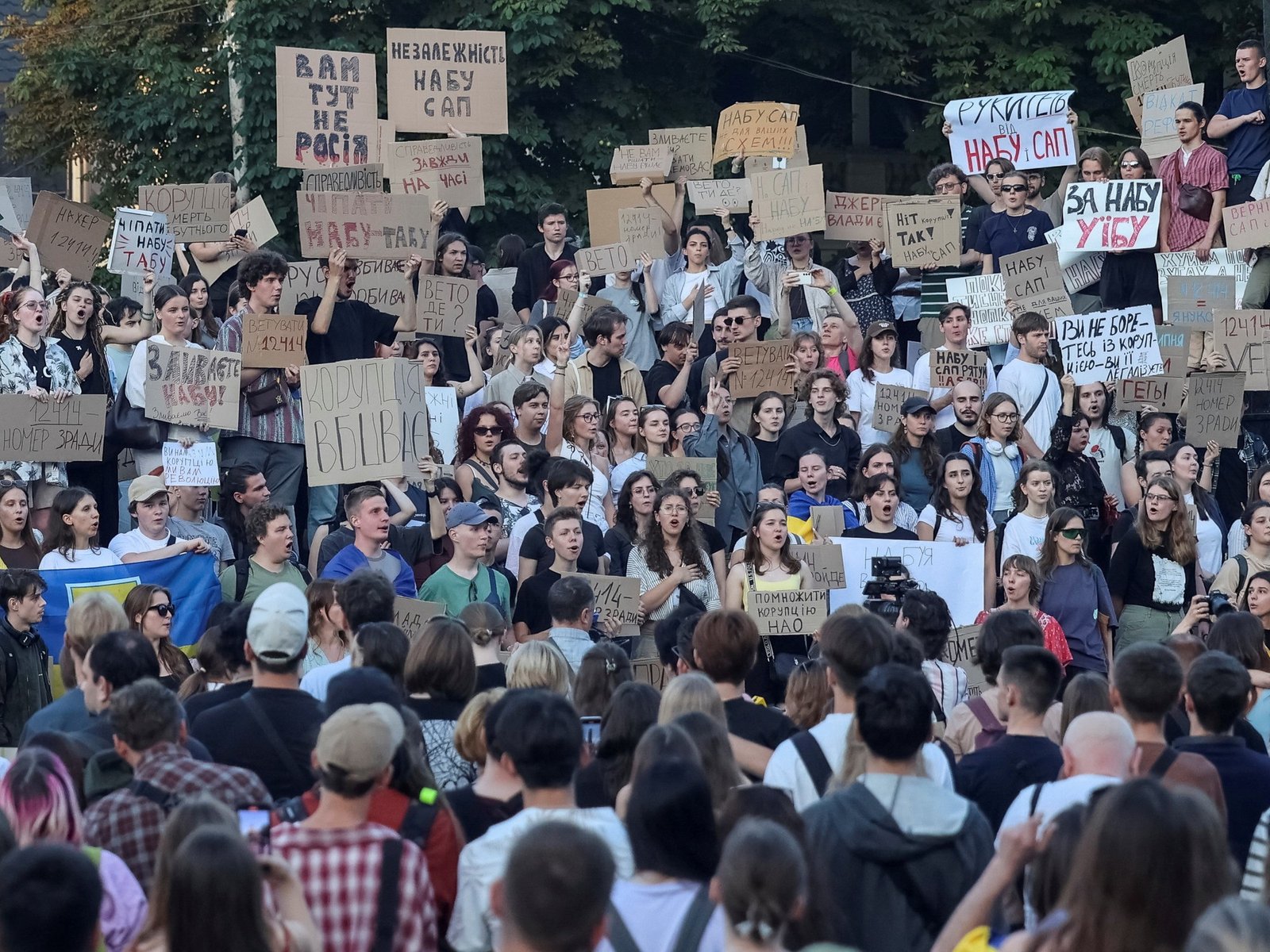
Advertencia de funcionarios de la UE
Negociaciones en Estambul
Ucrania,Volodímir Zelenski,Rusia,Guerra Rusia-Ucrania
INTERNACIONAL
Trump admin official to meet with Israel, Qatar amid push for Gaza ceasefire

NEWYou can now listen to Fox News articles!
Special Envoy Steve Witkoff is expected to meet with Israeli and Qatari officials in Rome on Thursday as the U.S. pushes for a ceasefire deal in Gaza.
Hamas and Israel are engaging in indirect negotiations to end the war that has raged on for nearly two years. However, Witkoff’s itinerary depends on the progress made in the talks. If the parties make enough progress in Rome, Witkoff will reportedly travel to Doha to finalize the deal, according to Axios.
The outlet also reported that sources indicated the meeting in Rome could suggest that a deal is near — possibly just days away.
Earlier this month, Israel agreed to a U.S.-backed, 60-day ceasefire proposal that would lead to the end of the war. This deal includes a phased release of hostages, the withdrawal of Israeli troops from parts of Gaza and talks on ending the conflict, according to Reuters.
Special Envoy Steve Witkoff is expected to meet with Israeli and Qatari officials in Rome on Thursday to secure a deal to end the war in Gaza. (Dawoud Abo Alkas/Anadolu/Kevin Dietsch/Getty Images)
ISRAEL, HAMAS TALKS DRAG AS AID GROUP CHAIR TELLS UN TO STOP ACTING LIKE THE ‘MAFIA’
«My representatives had a long and productive meeting with the Israelis today on Gaza. Israel has agreed to the necessary conditions to finalize the 60 Day CEASEFIRE, during which time we will work with all parties to end the war. The Qataris and Egyptians, who have worked very hard to help bring peace, will deliver this final proposal. I hope, for the good of the Middle East, that Hamas takes this deal because it will not get better — IT WILL ONLY GET WORSE,» President Donald Trump wrote on Truth Social on July 1.
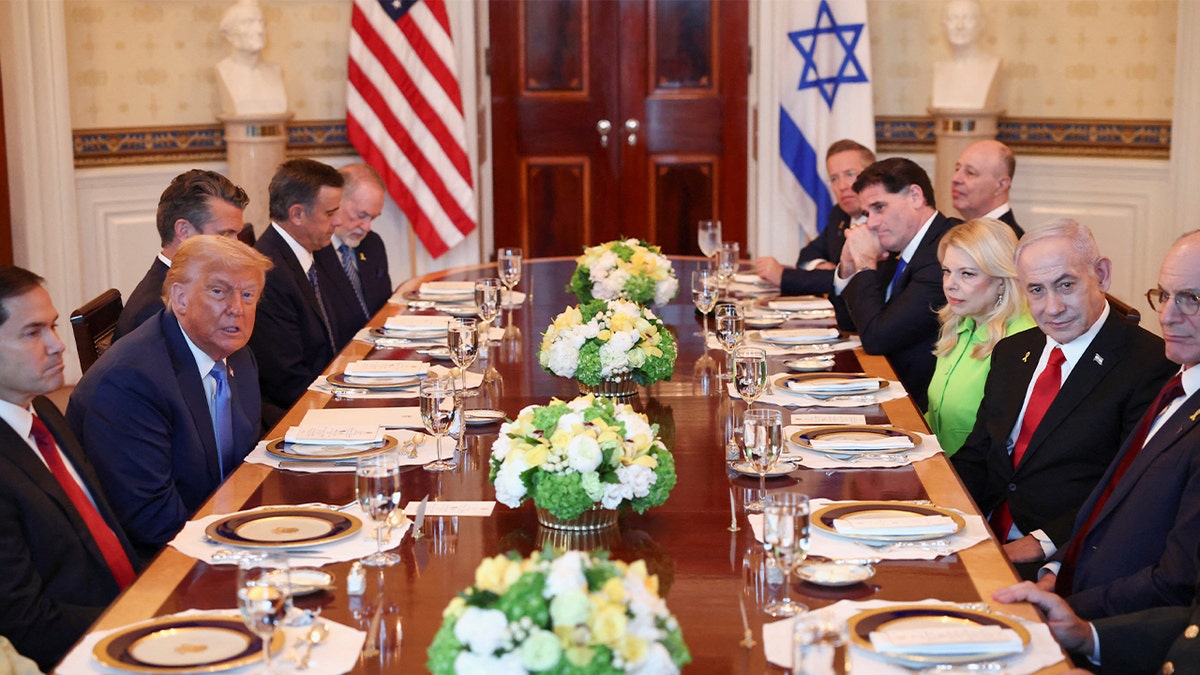
President Donald Trump holds a bilateral dinner with Israeli Prime Minister Benjamin Netanyahu, with Defense Secretary Pete Hegseth and Secretary of State Marco Rubio in attendance, at the White House in Washington, D.C., July 7, 2025. (REUTERS/Kevin Lamarque)
ISRAEL ACCEPTS TRUMP-LED CEASEFIRE PLAN THAT COULD END GAZA WAR WITHIN 60 DAYS
Trump appeared optimistic about the possibility of Israel and Hamas reaching a deal to end the war. On July 16, while signing the HALT Fentanyl Act, Trump thanked Witkoff, praising him for doing «a fantastic job» and said that there was «some good news on Gaza,» though he did not elaborate.
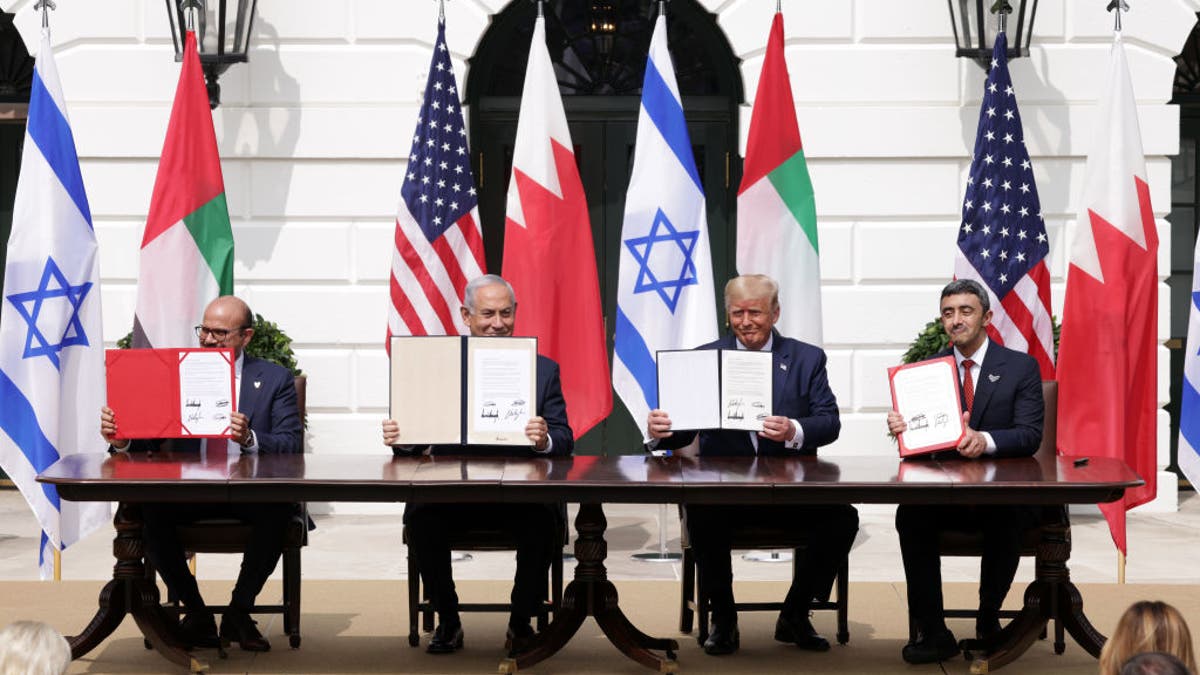
From left to right, Foreign Affairs Minister of Bahrain Abdullatif bin Rashid Al Zayani, Prime Minister of Israel Benjamin Netanyahu, President Donald Trump and Foreign Affairs Minister of the United Arab Emirates Abdullah bin Zayed bin Sultan Al Nahyan participate in the signing ceremony of the Abraham Accords on the South Lawn of the White House on Sept. 15, 2020, in Washington, D.C. (Photo by Alex Wong/Getty Images)
TRUMP PRESSURES ISRAEL TO END GAZA CONFLICT AS HE EYES ABRAHAM ACCORDS EXPANSION
If Trump can secure an end to the war, it could mean an expansion of the Abraham Accords, one of the signature efforts of Trump’s first administration, which saw Israel sign normalization agreements with the United Arab Emirates, Bahrain, Morocco and Sudan. However, Trump has yet to detail which countries would be added.
Israeli Minister of Foreign Affairs Gideon Sa’ar said on June 30 that Israel was «serious» about seeking an end to the conflict. He added that Jerusalem has an interest in «countries, such as Syria and Lebanon, our neighbors, to the circle of peace and normalization.»
CLICK HERE TO GET THE FOX NEWS APP
Fox News Digital’s Greg Wehner and Caitlin McFall contributed to this report.

 POLITICA3 días ago
POLITICA3 días agoExpulsada del Gobierno, Victoria Villarruel empieza a tomar distancia, pero no tiene proyecto político para este año

 POLITICA3 días ago
POLITICA3 días agoLa CGT evalúa adelantar a octubre el recambio de sus autoridades y define una movilización contra Milei

 POLITICA2 días ago
POLITICA2 días ago🗳️ El chamuyo de las elecciones en la Provincia: se postulan, pero no a asumen

























